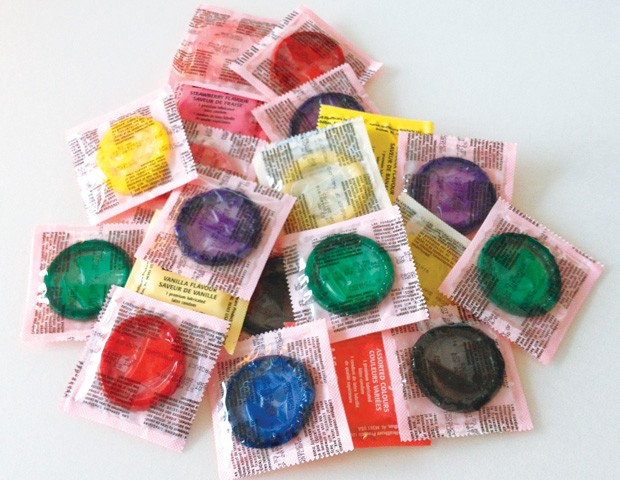16 tips for safer sex
Expressing your sexuality can lead to satisfying relationships, enhance self-esteem and quality of life.
Practising safer sex will reduce your risk of getting or spreading a sexually transmitted infection (STI) or having an unplanned pregnancy. Plus, you’ll have greater peace of mind. These 16 tips will help protect you and your partners.
Don’t miss Health Services' annual condom giveaway on November 24 from 10 a.m. to 3 p.m. in the mezzanine of the Hall Building. It’s also your chance to talk with a health promotion specialist or nurse, book an appointment and pick up more information.
Use protection
Condoms, dental dams and gloves will prevent microorganisms, the bacteria and viruses that cause STIs, from being spread from one person to another.
Negotiate sexual activities with your partners
Talking it out is a big part of having sex. You and your partners should always be on the same page about activities that pose any sort of danger to either of you.
Negotiating means talking to your partner(s) about using protection, participating in activities that can spread STIs and determining if sex outside your relationship is acceptable. If your partner(s) doesn’t wish to use a barrier, then you need to negotiate what sexual activities (if any) you will do.
Share relevant info
Discuss your sexual history and STI status with your partners. Having the right information will help you make informed decisions about sexual activity and reduce your risk of getting or spreading an STI.
Get tested
Many people aren’t aware they have an STI and spread it to their partners. The only way to be sure of your STI status is to get tested. If you’re sexually active, book an appointment with a nurse to assess your needs. Now, nurses can perform STI tests at the university’s walk-in clinics or during a regular medical appointment.
Get vaccinated against STIs
Getting vaccinated will greatly reduce your risk of getting infected. Vaccinations are available for Hepatitis B and the Human Papilloma Virus (HPV), which can cause cervical and penile cancer.
Inform your previous partners if you discover you have an STI
Some STIs have no noticeable symptoms, or very mild ones. If you are diagnosed with an STI, let your current and previous partners know so that they can get tested or treated, if necessary.
If you feel uncomfortable contacting a partner you can call Santé Montreal's Partner Notification Portal (514-528-2464), which can anonymously call your partners on your behalf.
Review abstinence
The only surefire way to avoid STIs is to abstain from sex. However, if your definition of abstinence includes kissing or body rubbing, then an STI can still be passed between partners.
Enjoy solo activities
If you’re on your own — masturbating, watching pornography, even having phone sex — you’re at no risk of contracting or transmitting an infection.
Properly disinfect sex toys
Sex toys can spread microorganisms from one user to another, so if you’re sharing, make sure to clean them properly.
Participate in activities where fluids aren’t exchanged
You won’t spread STIs that are transmitted through fluids — like HIV and Hepatitis B — through body rubbing, massages and S&M. But some infections, including genital herpes and warts, can be transmitted by skin-to-skin contact.
Avoid contact with another person’s sores
Sores from genital herpes or warts can be spread to others. Some might even be so small that you won’t be able to see them. Barrier protection can reduce the risk of contact with them, provided the condom or dental dam covers the sores.
Limit your sexual partners
It’s simple math: studies show that the more sexual partners a person has, the greater risk they have of contracting an STI.
Avoid sex while intoxicated
Sharing a drink with a partner or potential partner can make for a romantic evening. But if you’re drunk (or on drugs that diminish your decision-making abilities), you run a greater risk of making choices you wouldn’t while sober — and that may lead to unwanted consequences.
Treat your STI
Certain STIs (like chlamydia and gonorrhea) can be cured with treatment. If you treat an STI, you won’t spread it to others. You can, however, become reinfected if you are exposed to the bacteria again.
Stay informed about healthy sexuality, safer sex and STIs
Read up. Speak with friends, family and trusted health professionals. The more you know, the better prepared you’ll be to protect yourself and your partners.
Adopt a positive attitude about safer sex
Focus on its many benefits. Figure out how it fits into your value system, and make it part of your life. Learn how STIs are transmitted — and how they can interfere with your goals. Safer sex always makes sense.
Visit Health Services to learn more about safer sex.
Don’t miss Health Services' annual condom giveaway on November 24, 2015, from 10 a.m. to 3 p.m. in the mezzanine of the Hall Building.
